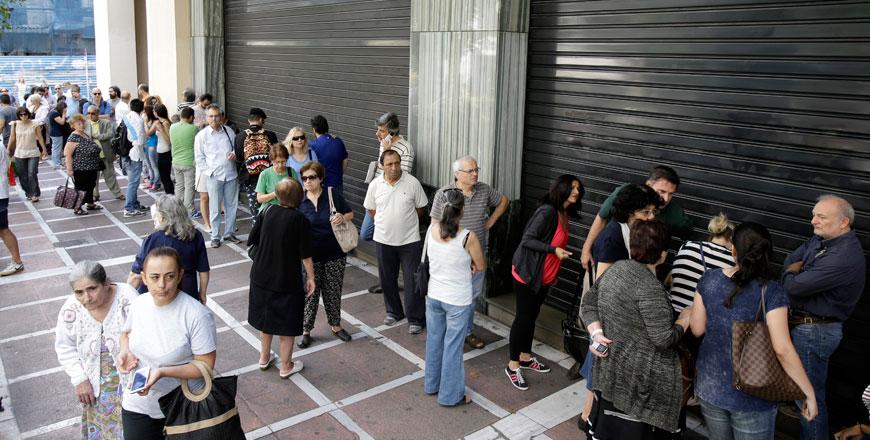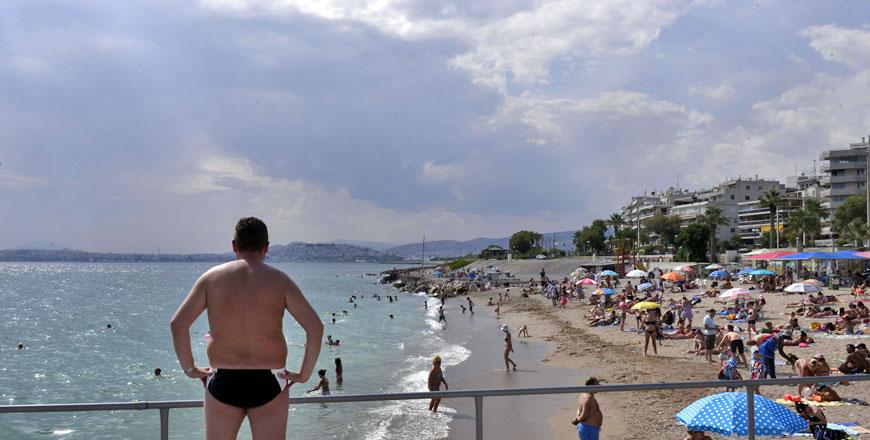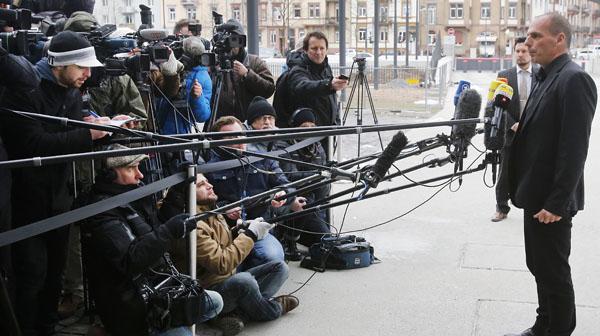You are here
Eurozone readies for Greek default after Tsipras referendum call
By Reuters - Jun 27,2015 - Last updated at Jun 27,2015

People stand in a queue outside a bank which operates on Saturday but eventually didn't open, in central Athens, on Saturday (AP photo)
ATHENS/BRUSSELS — The eurozone got ready to deal with a Greek debt default this week after refusing to extend credit following Prime Minister Alexis Tsipras’s surprise announcement of a referendum on an offer from creditors that his leftist government rejected.
Athens asked for an extension of Greece’s bailout programme beyond Tuesday, the day it must pay 1.6 billion euros to the International Monetary Fund (IMF) or go bust.
But the other 18 members of the eurozone unanimously rejected the request, freezing Greece out of further discussions with the European Central Bank (ECB) and IMF on how to deal with the fallout from a historic breach in the European Union’s (EU) 16-year-old currency.
The swift rejection was a startling demonstration of the degree to which Tsipras had alienated the rest of the currency bloc with a final-hour announcement that upended five months of intense talks.
The Eurogroup of finance members shut Greece’s Yanis Varoufakis from a meeting in Brussels and issued a statement without him, accusing Athens of breaking off negotiations unilaterally.
“The current financial assistance arrangement with Greece will expire on June 30, 2015, as well as all agreements related to the current Greek programme,” it said, making clear its refusal of a grace period to hold the vote.
Varoufakis said the refusal to provide an extension “will certainly damage the credibility of the Eurogroup as a democratic union of partner member states”.
“I’m very much afraid that that damage will be permanent,” he added.
The offer from creditors requires Greece to cut pensions and raise taxes in ways that Tsipras has long argued would deepen one of the worst economic crises of modern times in a country where a quarter of the workforce is already unemployed.
But voters in other eurozone states, including economic powerhouse, other southern states which have suffered harsh austerity in return for EU cash and poor eastern countries with living standards much lower than Greece, have lost patience.
Jeroen Dijsselbloem, the Dutch finance minister and chair of the Eurogroup, said Greek lawmakers should think about whether the referendum was wise before agreeing to hold it, essentially appealing directly to the Greek parliament to defy Tsipras.
Worried the country could default and even leave the eurozone, some Greeks queued up at cash machines to withdraw funds, though there were no signs of panic in Athens. Many sounded defiant, saying Tsipras had offered them an important chance to determine their own fate.
The eurozone finance ministers met in Brussels for what had been intended as a final negotiation for a deal.
But after they were blindsided by Tsipras’ surprise middle-of-the-night announcement that he rejected their offer and would put it to voters only after Tuesday’s deadline, one after another said all that remained to discuss was “Plan B” — how to limit the damage of default.
“We have no basis for further negotiations,” German Finance Minister Wolfgang Schaeuble said ahead of the meeting. “Clearly we can never rule out surprises with Greece, so there can always be hope. But none of my colleagues with whom I’ve already spoken see any possibilities for what we can now do.”
Finland’s Alexander Stubb called it “potentially a very sad day, specifically for the Greek people. I think with the announcement of this referendum we’re basically closing the door for any further negotiations”.
With most Greek banks closed for the weekend, there was no sign of panic on the streets of Athens. Government officials said there was no plan to impose capital controls that would limit withdrawals.
But police tightened security around bank teller machines as lines formed at some in the darkness almost as soon as Tsipras’ early hours televised speech was finished.
The Bank of Greece said it was making “huge efforts” to ensure the machines remained stocked.
One branch of Piraeus bank that is normally open on Saturdays was shut, with around 100 people queued outside. A senior executive said the plan was to open the branch but staff were weighing security concerns because of the queue.
After months of wrangling with the lenders, Tsipras announced that he would put the terms of the creditors’ “humiliating” offer to a popular vote on July 5.
Tsipras said he would respect the outcome of the vote, but he argued the lenders demands “clearly violate European social rules and fundamental rights”, would asphyxiate Greece’s flailing economy and aimed at the “humiliation of the entire Greek people”.
Greece’s stricken banks depend on emergency liquidity from the ECB to stay open, and the banking system faces at the very least a further flood of withdrawals after billions have left in recent weeks.
Long lines were reported in some supermarkets in Athens as people stocked up with supplies.
However, along with the worry, there were also signs of defiance and almost relief after years of relentless austerity and seemingly endless rounds of crisis meetings with lenders.
“The referendum, I think, is necessary in the sense that we must send a message to Europeans that the Greek people are not enslaved, we are no longer under occupation,” said Elias Papachadzis, a 49-year-old Athenian resident.
Related Articles
ATHENS — Greeks took to beaches, cafes and churches on Sunday, just like they do every week, but the mood was downbeat as the country teeter
ATHENS — Greeks voted overwhelmingly on Sunday to reject terms of a bailout, risking financial ruin in a show of defiance that could splinte
Greece's new leftist government appealed to the European Central Bank (ECB) on Wednesday to keep its banks afloat as it seeks to negotiate debt relief with its eurozone partners, but Germany rejected any rollback of agreed austerity policies.













